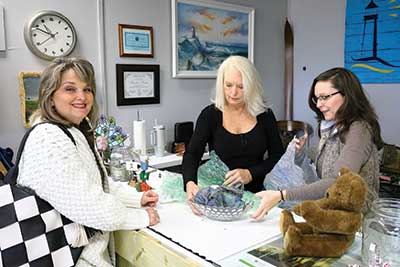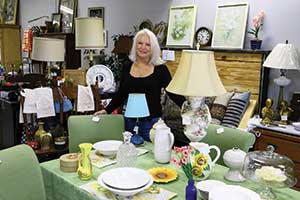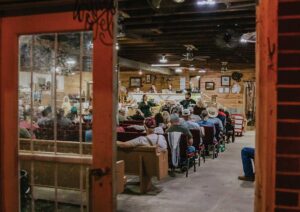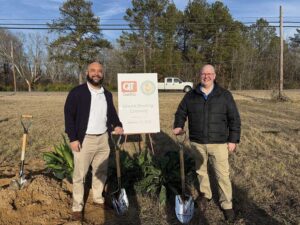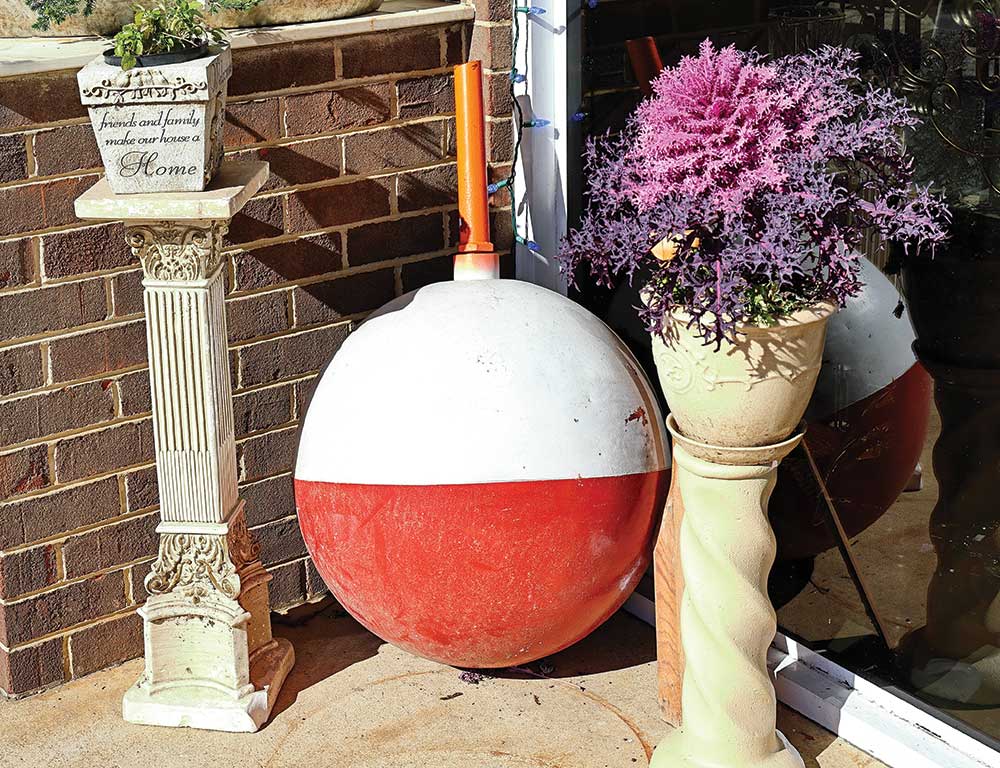
Freedom’s Finds uses thrifting to help survivors of human trafficking
Story by Roxann Edsall
Photos by Richard Rybka
Gabby Martin knows human trafficking is not just a big city problem, a fact she has heard repeated in a number of training events aimed at helping victims. It can happen anywhere at any time.
A recent report by the Federal Bureau of Investigation defines the potential area of vulnerability to human trafficking as “any U.S. community – cities, suburbs, and rural areas.”
Martin and two close friends, having been stirred by viewing the movie, Sound of Freedom, started a not-for-profit mission in Pell City that hopes to help victims of human trafficking. Named Freedom’s Harbor, the mission gives a nod to the movie’s name and its mission in helping women who have escaped from or been rescued from traffickers. They are raising money to build a home for those who have survived this unspeakably painful horror.
One of the avenues they are using to reach that goal is through the opening of a new resale store called Freedom’s Finds. Located in downtown Pell City, the 2,900-square-foot store features a variety of previously owned, but well-maintained merchandise at thrift store prices.
“We started the store to build revenue for the house itself and to pay the bills for running the home,” said Martin. “The plan further down the road is for the ladies who will be living in the home to work in the store if they want to. We want the store to support the mission of giving these ladies a safe harbor to begin the healing process.”
Seven years ago, The WellHouse opened in St. Clair County for women who have been victims of human trafficking. Carolyn Potter, The WellHouse’s chief executive officer, has met with Martin and welcomes any help for these victims. “There are times when we are full and we could always use help with a place for a lady to stay until we have a place for her,” says Potter.
Martin plans to position Freedom’s Harbor as a stabilization home for short-term living while waiting for a placement in a facility like The WellHouse, which offers long-term transitional care and counseling.
Why St. Clair? The very busy Interstate 20, the thoroughfare that bisects the southern part of the county and connects Atlanta to Birmingham, is commonly referred to as the superhighway of human trafficking, because it connects Atlanta to Dallas and is close to Interstate 65 for northbound and southbound travel.
Adding to the county’s vulnerability is the proximity to Atlanta’s Hartsfield International Airport, which has been identified as the second busiest airport for human trafficking in the country by the Polaris Project, which operates the National Human Trafficking Hotline.
According to the National Human Trafficking Hotline, in the 17 years since its inception, it has received over 10,000 cases, with more than 16,000 victims, and those numbers are rising.
In 2021, they issued a report by state, and Alabama’s hotline received 80 cases with 216 victims involved. It is difficult to quantify the exact number of victims of human trafficking because of the complex nature of the crime and mental health impacts it leaves on its victims.
Countless victims never come forward due to the physical and psychological abuse from their traffickers.
In a move to bolster resources and to better focus on ways to help, Martin has reached out to several agencies who have firsthand knowledge of the human trafficking crisis.
She has gone through training from a number of those resources, including from A21, an anti-human trafficking group whose name stands for Abolishing Injustice in the 21st Century. A21 operates on six continents and in 21 countries with their mission to “abolish slavery everywhere forever,” a daunting task, considering the International Labor Organization’s estimate of 49.6 million victims of human trafficking worldwide.
They consider education to be an important part of their focus, including providing information for those, like Martin, wanting to offer services to victims, and offering programs to educate first responders on how to help victims.
“We also have a school curriculum that is available, designed for ages from kindergarten through high school,” said Kim Thompson, A21’s chief development officer. “Educating children and youth on what to look out for is an important step in the prevention of human trafficking.”
Thompson tells about launching the pilot program for education in a junior high school and having several students come forward as potential victims of grooming, trafficking and exploitation.
“One of these students was planning to meet with someone she had connected with online, and because of what the student learned through A21’s curriculum, she shared with her teacher what was happening. Her teacher alerted law enforcement officers, who were able to identify the individual and keep the student from a potentially dangerous situation.”
Thompson has had a heart for victims all her life. Her first exposure to human trafficking was early in her career when she was working as a summer camp director and had one of her campers become inconsolable.
“We were not able to get her to tell what the problem was at first,” said Thompson. “But eventually she told us her father was raping her and letting others in their apartment complex do the same. She desperately didn’t want to go home with him. I was heartbroken. I didn’t even know what trafficking was at the time.”
The camp staff contacted the sheriff’s department, who got the FBI involved. “In the end, the father was arrested, and the girl was removed from the home,” Thompson added. “Oh, and she was just 12 years old.”
Even the term, “human trafficking,” is often misunderstood. People tend to focus on the perceived “movement” part of the words. “Movement is not what makes a situation human trafficking,” explains Thompson. “People who are smuggled are not necessarily being trafficked. They’re vulnerable to human trafficking, though, because of their loss of control. Force, fraud or coercion is what defines human trafficking.”
Human trafficking includes both sex trafficking and labor trafficking. Victims of both are lured by the prospects of a better job, better future, other fraudulent promises or are forced into trafficking by a family member.
They never receive the job, promised future or compensation but, often, stay with their trafficker in response to threats by their captor, which often include threats against the victim’s family.
“The vast majority of people know their trafficker,” says Thompson. “They are recruited or groomed by people they know or think they know. Our children are especially vulnerable because of their online activity.”
While the number of cases of trafficking in Alabama remains lower than surrounding states, neighboring states Georgia and Florida are among the list of top 10 states for human trafficking cases, according to the National Human Trafficking Hotline.
Gabby Martin knows trafficking knows no community size. “Anywhere people feel trapped or stuck, desperate or abused,” says Martin, “that’s where people are vulnerable.”
Having been in an abusive relationship over a decade ago, she knows what desperation feels like. She feels lucky to have escaped that situation and to have found a room at a YWCA domestic violence shelter in Eden, a home which has since closed. “We want to be that beacon of light for women who have escaped a trafficking situation, to help them with a place to shelter, to receive life skills, counseling and to help them become self-sufficient.”
Editor’s Note: For more information or to donate – www.freedomsharbor.com. Freedom’s Finds is open Wednesday-Saturday 10 a.m. – 4 p.m. Coming in August – A deeper look into the hope and help provided by another organization that supports and provides help to survivors of human trafficking in St. Clair County.











